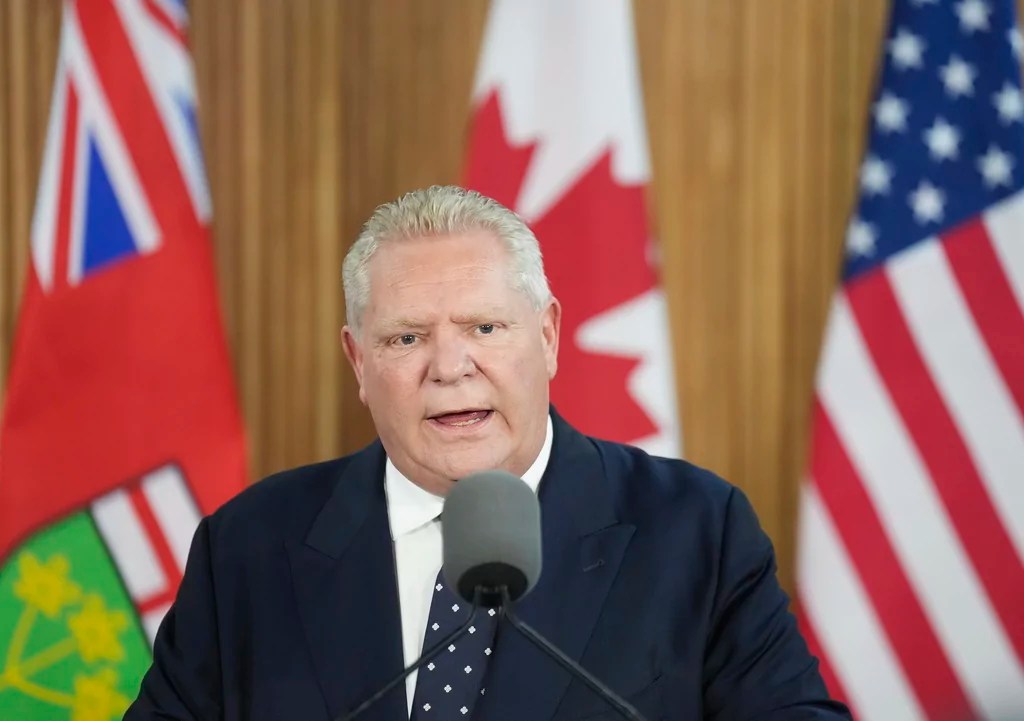


Canada’s retaliatory tariffs on electricity supplied to the United States escalated a trade war between the two countries on Monday.
Ontario’s 25% electricity surcharge will primarily affect roughly 1.5 million Americans living in three states reliant on Canadian energy — Minnesota, New York, and Michigan — Ontario Premier Doug Ford announced. The tariffs took effect Monday, with Ford threatening to increase the levy and cut off electricity “entirely” should the Trump administration respond with more tariffs.
Recommended Stories
- Gas prices: Less expensive than last week, last month, and last year
- House votes to cancel energy efficiency labeling for appliances
- Gas prices: Decreases at the pumps continue to start the week
The news from Ford follows President Donald Trump’s move to enact 25% tariffs on Canada on March 4, with a lesser tariff of 10% on energy resources from the country. The Trump administration has branded the tariffs as a negotiating tactic meant to pressure the country into tightening border security and reducing the flow of fentanyl into the U.S. The narcotic has killed tens of thousands of people in the U.S. over the past five years.
The same day the Trump tariffs went into effect, Canada announced it would place retaliatory 25% tariffs on $21 billion worth of goods imported from the U.S.
Trump softened several components of the 25% tariffs on March 6 with an order giving certain Canadian imports a one-month exemption. Goods covered under the U.S.-Mexico-Canada Agreement are exempt from the tariffs. General Motors, Ford, and Stellantis, the big three auto companies, were also granted a one-month reprieve from the tariffs after industry leaders met with Trump.
But despite Trump’s pause, Ontario signaled anger over the economic sanctions has boiled over in Canada.

“Until these tariffs are off the table, until the threat of tariffs is gone for good, Ontario will not relent,” Ford said during a press conference on Monday in which he said the latest electricity levy could add $69 to U.S. consumers’ electricity bills. “We will not back down — pausing some tariffs, making last-minute exemptions won’t cut it; we need to end the tariffs once and for all.”
Trump has signaled further tariffs on the country could be in order if it fails to meet his demands for tightened border policies affecting the flow of fentanyl. Last week, he suggested a 250% tariff on Canadian lumber and dairy products could be forthcoming. The reciprocal tariffs would respond to Canada’s roughly 250% surcharge on U.S. dairy exports, the president said.
The potential tariffs against Canada on lumber and dairy products would not be enacted before April 2, Commerce Secretary Howard Lutnick said. If implemented, the tariffs would come in addition to steep surcharges China announced earlier this month it would place on Canada. China’s retaliatory action came in response to Canada’s 100% tariffs on Chinese electric vehicles and 25% tariff on Chinese steel and aluminum that went into effect last year.
The governors of the three states affected by Canada’s electricity surcharge have repeatedly expressed concern over the Trump administration’s readiness to use tariffs as a tool to combat the fentanyl crisis.
“Much of Minnesota’s natural gas comes from Canada, with five of the six natural gas pipelines that transport gas in Minnesota originating from Canada. Physical limitation to pipelines will make it hard to quickly switch to other sources, and the costs of the 10% tariffs will be passed on to Minnesota consumers,” a press release from Gov. Tim Walz’s (D-MN) office reads.
Govs. Gretchen Whitmer (D-MI) and Kathy Hochul (D-NY) also have warned that consumers in their states could face rising costs.
“These federal tariffs have been poorly conceived from the start: Crafted in secret with no transparency and no clear economic rationale, they’ve only served to destabilize our capital markets and create uncertainty among New York families and businesses,” Hochul said Monday. “This is a textbook example of bad public policy, and I’m calling on President Trump to immediately rescind his tariffs before they inflict further damage on working families — and if he won’t act, Congress must.”
The Trump administration has argued the tariffs are necessary in light of “the growing presence of Mexican cartels operating fentanyl and nitazene synthesis labs in Canada.”
DEMOCRATIC GOVERNORS SLAM ‘TRUMP TAX’ AS TARIFFS GO INTO EFFECT
“A recent study recognized Canada’s heightened domestic production of fentanyl, and its growing footprint within international narcotics distribution,” the White House said in a press release. “Tariffs are a powerful, proven source of leverage for protecting the national interest. President Trump is using the tools at hand and taking decisive action that puts Americans’ safety and our national security first.”
The Washington Examiner reached out to the three governors for comment.
